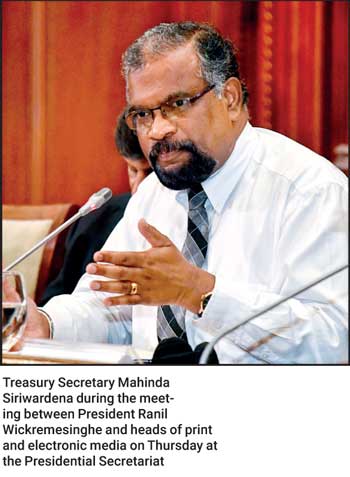Sunday Feb 22, 2026
Sunday Feb 22, 2026
Saturday, 25 March 2023 00:09 - - {{hitsCtrl.values.hits}}
 By Nisthar Cassim
By Nisthar Cassim
The Government can use the entirety of $ 2.9 billion four year Extended Fund Facility (EFF) from the International Monetary Fund (IMF) for budgetary support according to Treasury Secretary Mahinda Siriwardena.
During a Q&A at the forum chaired by President Ranil Wickremesinghe with the heads of print and electronic media, Siriwardena said that there is no cap within $ 2.9 billion for such support.
Unlike in the past 16 programs with the IMF when funding had been to bolster foreign reserves, it was the first time that the use of money was opened up for budgetary support.
Siriwardena explained that Sri Lanka will be using EFF disbursements via the Central Bank to meet Government expenses such as payment of salaries and pension as well as external debt servicing.
The IMF EFF program envisages Sri Lanka receiving $ 660 million per annum between 2023 and 2026 and $ 329 million in 2027 subject to half yearly review.
Finance Minister Ranjith Siyambalapitiya yesterday revealed that of the $ 333 million received as the first tranche of EFF, $ 121 million was used to settle a loan instalment of the Indian Credit Line.
IMF Staff Report said all purchases (by Sri Lanka) under the EFF arrangement are proposed to take the form of budget support and this is to ease domestic financing needs of the Government.
As per the program the CBSL is expected to make outright FX purchases on a net basis of $1.4 billion in 2023.
IMF said external financing needs in 2022 were covered by savings from the debt moratorium ($ 2.8 billion), emergency support from the International Financing Institutions (IFIs) from repurposing of existing project loans and support from key bilateral partners, such as India (food and fuel credit lines, currency swap, and ACU balances accumulation).
At end-December 2022, the Fund’s exposure to Sri Lanka stood at $ 1 billion or SDR 798 million.
To contain recurrent expenditure, the Government has committed to develop strategies to limit growth in the public sector wage bill and public pension spending, while avoiding salary cuts and allowing for limited public sector salary and public pension payment increases to partially account for inflation during the program within the program’s primary balance targets.
Salaries and wages in the public sector in 2022 amounted to Rs. 956 billion or 4% of GDP as against Rs. 846 billion or 4.8% in 2021.
Given fiscal space constraints on capital expenditure, the Government will take measures to boost public investment efficiency, as recommended by the 2018 IMF Public Investment Management Assessment. While expenditure rationalisation will contribute to fiscal consolidation, the Government will preserve spending on health, education, and social protection.
Sri Lanka has also committed to an ambitious and primarily revenue-based fiscal consolidation strategy. The 2023 budget aims to reduce the primary deficit to 0.7% of GDP in 2023 (quantitative performance criterion) from 3.8% of GDP in 2022, with tax revenue targeted to reach about 10% of GDP (indicative target).
The program aims to improve the primary balance to a surplus of 0.8% of GDP in 2024 and 2.3% of GDP from 2025 onwards, an ambitious but feasible medium-term fiscal path.
The national budgets will be consistent with program parameters and needed revenue measures will be implemented in a timely fashion (structural benchmarks). Achieving the targets entails additional revenue measures of 2.7% of GDP in 2024-25, combined with expenditure rationalisation. The authorities are also committed to clearing all outstanding spending arrears by end-June 2023 (quantitative performance criterion).
Leading up to the economic crisis, Sri Lanka ran persistently large fiscal deficits, which reached 12.1% of GDP in 2020 and 11.6% of GDP in 2021.